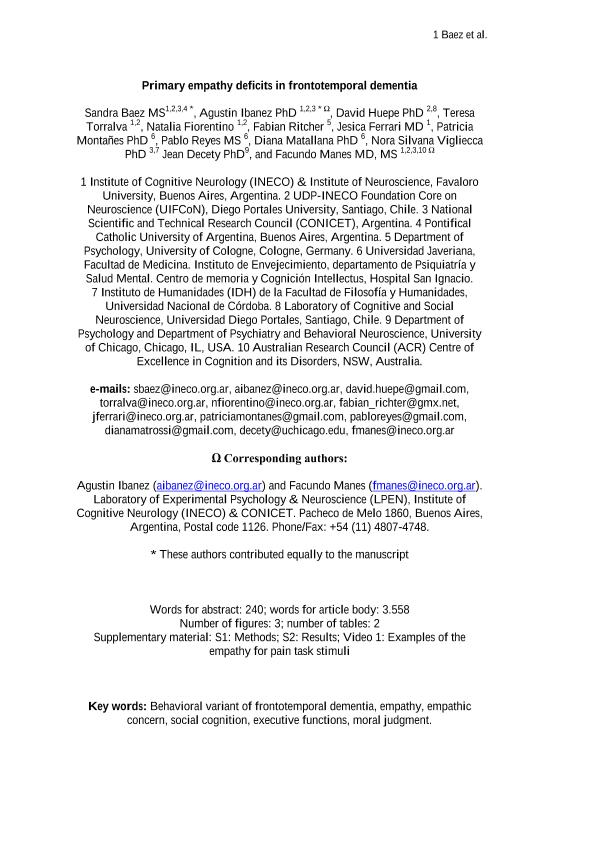Mostrar el registro sencillo del ítem
dc.contributor.author
Báez Buitrago, Sandra Jimena

dc.contributor.author
Manes, Facundo Francisco

dc.contributor.author
Huepe, David
dc.contributor.author
Torralva, Teresa

dc.contributor.author
Fiorentino, Natalia
dc.contributor.author
Richter, Fabian
dc.contributor.author
Huepe-Artigas, Daniela
dc.contributor.author
Ferrari, Jesica Celeste

dc.contributor.author
Montañes, Patricia
dc.contributor.author
Reyes, Pablo
dc.contributor.author
Matallana, Diana
dc.contributor.author
Vigliecca, Nora Silvana

dc.contributor.author
Decety, Jean
dc.contributor.author
Ibañez, Agustin Mariano

dc.date.available
2020-09-14T17:54:48Z
dc.date.issued
2014-10
dc.identifier.citation
Báez Buitrago, Sandra Jimena; Manes, Facundo Francisco; Huepe, David; Torralva, Teresa; Fiorentino, Natalia; et al.; Primary empathy deficits in frontotemporal dementia; Frontiers Research Foundation; Frontiers in Aging Neuroscience; 6; 262; 10-2014; 1-11
dc.identifier.issn
1663-4365
dc.identifier.uri
http://hdl.handle.net/11336/113944
dc.description.abstract
Loss of empathy is an early central symptom and diagnostic criterion of the behavioral variant frontotemporal dementia (bvFTD). Although changes in empathy are evident and strongly affect the social functioning of bvFTD patients, few studies have directly investigated this issue by means of experimental paradigms. The current study assessed multiple components of empathy (affective, cognitive and moral) in bvFTD patients. We also explored whether the loss of empathy constitutes a primary deficit of bvFTD or whether it is explained by impairments in executive functions (EF) or other social cognition domains. Thirty-seven bvFTD patients with early/mild stages of the disease and 30 healthy control participants were assessed with a task that involves the perception of intentional and accidental harm. Participants were also evaluated on emotion recognition, theory of mind (ToM), social norms knowledge and several EF domains. BvFTD patients presented deficits in affective, cognitive and moral aspects of empathy. However, empathic concern was the only aspect primarily affected in bvFTD that was neither related nor explained by deficits in EF or other social cognition domains. Deficits in the cognitive and moral aspects of empathy seem to depend on EF, emotion recognition and ToM. Our findings highlight the importance of using tasks depicting real-life social scenarios because of their greater sensitivity in the assessment of bvFTD. Moreover, our results contribute to the understanding of primary and intrinsic empathy deficits of bvFTD and have important theoretical and clinical implications.
dc.format
application/pdf
dc.language.iso
eng
dc.publisher
Frontiers Research Foundation
dc.rights
info:eu-repo/semantics/openAccess
dc.rights.uri
https://creativecommons.org/licenses/by-nc-sa/2.5/ar/
dc.subject
BEHAVIORAL VARIANT OF FRONTOTEMPORAL DEMENTIA
dc.subject
EMPATHY
dc.subject
EMPATHIC CONCERN
dc.subject
SOCIAL COGNITION
dc.subject
EXECUTIVE FUNCTIONS
dc.subject
MORAL JUDGMENT
dc.subject.classification
Neurociencias

dc.subject.classification
Medicina Básica

dc.subject.classification
CIENCIAS MÉDICAS Y DE LA SALUD

dc.title
Primary empathy deficits in frontotemporal dementia
dc.type
info:eu-repo/semantics/article
dc.type
info:ar-repo/semantics/artículo
dc.type
info:eu-repo/semantics/publishedVersion
dc.date.updated
2019-10-08T12:07:51Z
dc.journal.volume
6
dc.journal.number
262
dc.journal.pagination
1-11
dc.journal.pais
Suiza

dc.description.fil
Fil: Báez Buitrago, Sandra Jimena. Universidad Diego Portales; Chile. Consejo Nacional de Investigaciones Científicas y Técnicas; Argentina. Universidad Favaloro; Argentina. Instituto de Neurología Cognitiva. Laboratorio de Psicología Experimental y Neurociencia; Argentina
dc.description.fil
Fil: Manes, Facundo Francisco. Universidad Diego Portales; Chile. Australian Research Council Centre Of Excellence In Cognition And Its Disorders; Australia. Universidad Favaloro; Argentina. Consejo Nacional de Investigaciones Científicas y Técnicas; Argentina. Instituto de Neurología Cognitiva; Argentina
dc.description.fil
Fil: Huepe, David. Universidad Diego Portales; Chile
dc.description.fil
Fil: Torralva, Teresa. Universidad Favaloro; Argentina
dc.description.fil
Fil: Fiorentino, Natalia. Universidad Favaloro; Argentina. Universidad Diego Portales; Chile
dc.description.fil
Fil: Richter, Fabian. Universitat zu Köln; Alemania
dc.description.fil
Fil: Huepe-Artigas, Daniela. Universidad Diego Portales; Chile
dc.description.fil
Fil: Ferrari, Jesica Celeste. Universidad Favaloro; Argentina
dc.description.fil
Fil: Montañes, Patricia. Pontificia Universidad Javeriana; Colombia. Universidad Nacional de Colombia; Colombia
dc.description.fil
Fil: Reyes, Pablo. Pontificia Universidad Javeriana; Colombia
dc.description.fil
Fil: Matallana, Diana. Pontificia Universidad Javeriana; Colombia
dc.description.fil
Fil: Vigliecca, Nora Silvana. Consejo Nacional de Investigaciones Científicas y Técnicas; Argentina. Consejo Nacional de Investigaciones Científicas y Técnicas. Centro Científico Tecnológico Conicet - Córdoba. Instituto de Humanidades. Universidad Nacional de Córdoba. Instituto de Humanidades; Argentina
dc.description.fil
Fil: Decety, Jean. University of Chicago; Estados Unidos
dc.description.fil
Fil: Ibanez Barassi, Agustin Mariano. Consejo Nacional de Investigaciones Científicas y Técnicas; Argentina. Universidad Favaloro; Argentina. Universidad Diego Portales; Chile. Universidad de San Andrés; Argentina
dc.journal.title
Frontiers in Aging Neuroscience
dc.relation.alternativeid
info:eu-repo/semantics/altIdentifier/url/http://journal.frontiersin.org/Journal/10.3389/fnagi.2014.00262/abstract
dc.relation.alternativeid
info:eu-repo/semantics/altIdentifier/doi/http://dx.doi.org/10.3389/fnagi.2014.00262
Archivos asociados
